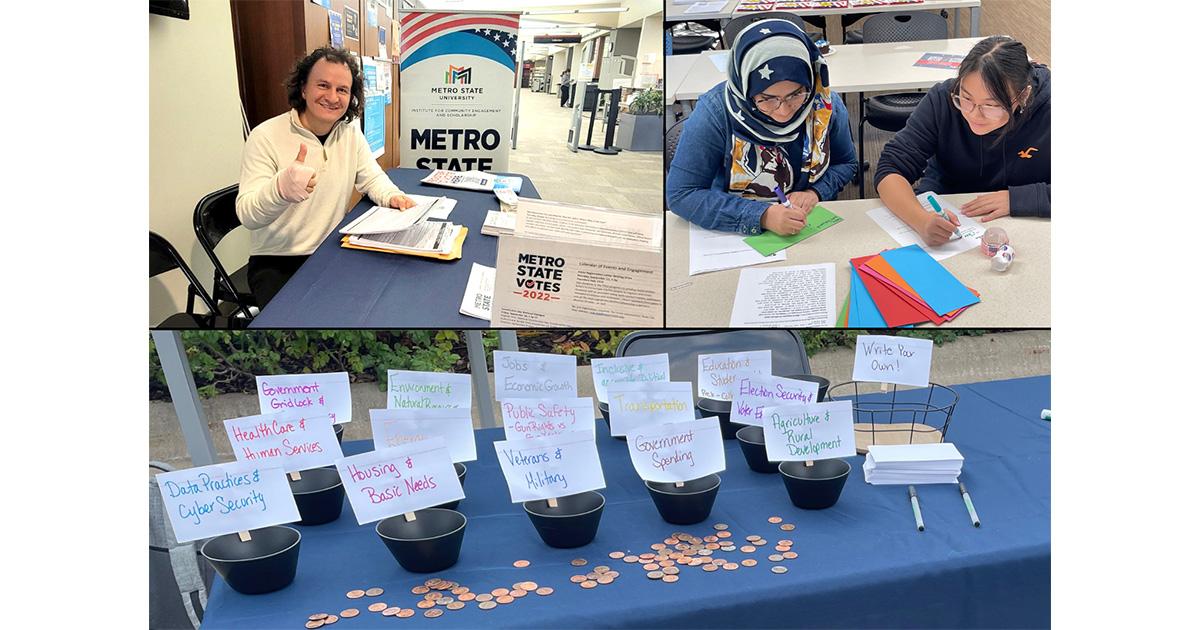
By Padra Lor, student writer, Institute for Community Engagement and Scholarship
On a bright September afternoon, Metro State students gathered in Founders Hall with cake in hand, music playing from a computer speaker, and democracy on their minds. Their goal – write personalized letters to hundreds of Americans throughout the country, encouraging them to vote in the 2022 midterm election by sharing why they believe voting is important.
Though cake may not be a part of every election cycle, Metro State has provided opportunities for students to engage and contribute to voter participation for more than 20 years. The Metro State Votes (MSV) campaign is a collaborative effort led by the Institue of Community Engagement and Scholarship in partnership with the university’s student senate, activities board, Criminal Justice Studies Department, Advocacy and Political Leadership program, Social Science Department, TRIO, and community partners to mobilize voters and encourage democratic education. Though the campaign changes in form over the years, MSV maintains its core goal—mobilize students to be informed and active voters. And this year is no exception. With redistricting based on the 2020 Census, every congressional seat, Minnesota house, and senate seat, and all Minnesota constitutional seats are up for election, making the 2022 midterm election a consequential opportunity for civic learning and action.
Metro State typically has a stronger voter turnout rate compared to other universities. This in part can be attributed to MSV efforts but also because of the higher-than-average student age of 31. In fact, the 2020 election saw 71.3% of eligible Metro student voters casting their ballots! Despite the strong student participation, midterm elections always have significantly low voter turnout, so this year’s work is focused on raising awareness, demystifying the voting process, and listening to students’ experiences with voting.
Samual Streukens, a second-year student in the Master of Advocacy and Political Leadership program (MAPL) is a student leader in the MSV campaign and works as the civic engagement director for the League of Women Voters. In his work, he sees a disconnect when it comes to eligible participants voting and casting ballots, “One, because they don’t see themselves being reflected within politics and the government, and therefore don’t think voting is worthwhile. On the other hand, students don’t have time—there are barriers to voting.” With election related events and opportunities for curricular connections, MSV aims to combat this disconnect between students and the voting process.
Rudy Lee, TRIO advisor and organizer of the voter letter writing event, says that he votes because, “we all have ideas of how our country should be better but we’re not actively doing anything about it, and the most important step you can take is vote for those representatives that align with your vision.”
Pachia Vang, a TRIO student mentor and letter writing participant says that she believes voting is important because it is the chance to represent your ideas and the ideas of those around you.
And Naba Imran, another TRIO student mentor and letter writing participant, says that she believes voting is important as you are “using your voice to serve your country,” yet feels disconnected from the voting process in America as a woman of color and as someone who has only seen the voting process in Pakistan.
Like Imran, many eligible voters say their relationship and experiences with voting may inhibit their participation, as Streukens notes, either from voting barriers or feeling as though they are not being represented in the election. MSV’s goal is to give students an opportunity to reflect on these issues and provide accurate information about the voting process itself because for some, “information is the barrier,” says Jodi Bantley, associate director for Civic and Community Partnerships within the Institute for Community Engagement and Scholarship. Indeed, several events aim to make students feel more confident when it comes to engaging in and understanding politics. With the return to campus, voter registration and voter information tabling is back in the library every Tuesday and Thursday now through November 8 and events like the Election Night Party hosted by Professor Matt Filner and students in his POL 305 class and Election Decompression on November 18, hosted by the MAPL program and the Advocacy and Political Leadership and Service club (APLS) provide spaces for collective learning and action.
MSV provides voter education with the intent of getting students to vote, but it goes deeper than that. When asked what the objective of MSV is, Bantley shared that it is to encourage students to “build civic habits over time, because as studies show, if you vote in three consecutive elections, you will most likely become a lifetime voter.” Streukens shares that goal and says that it is to “make people feel more engaged beyond the election. There is always a big push to get people to vote, but that’s just the beginning of what government and community can do to improve people’s lives.” In both of their eyes, voting is just the beginning as the Metro State Votes campaign produces long-term change by creating civic leaders within the community; those who exercise their rights, use their voice, educate others, get involved within the election and community, and fight to create the future that they want to live in.
Visit mnvotes.org to register to vote, find polling locations, print sample ballots, and more.
